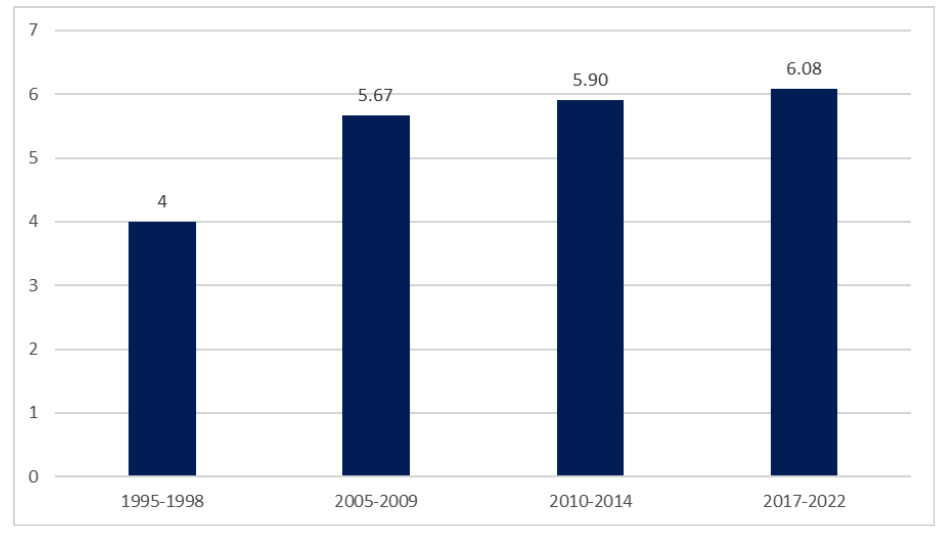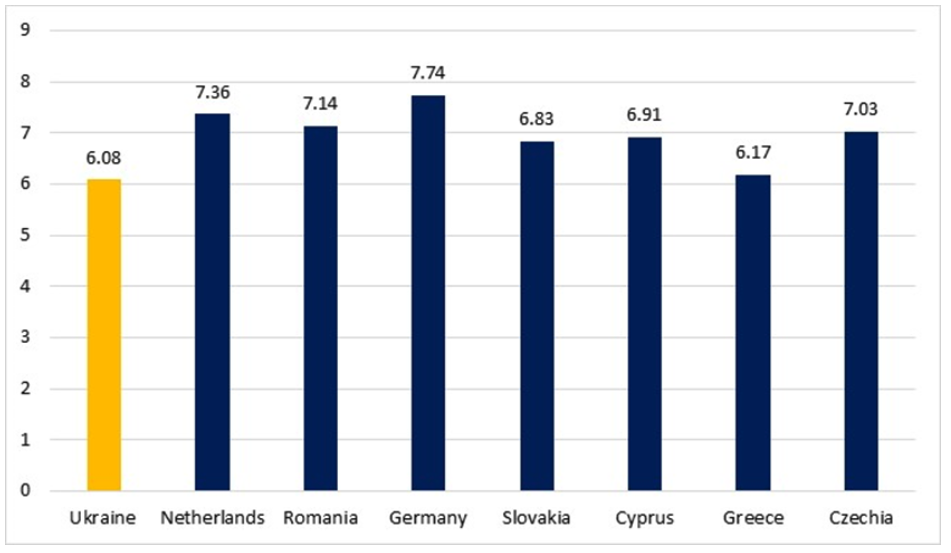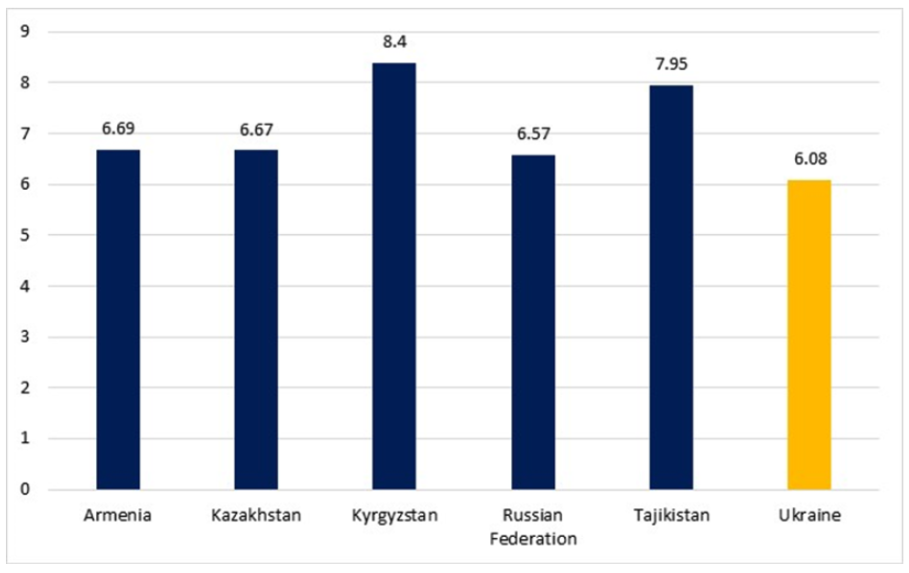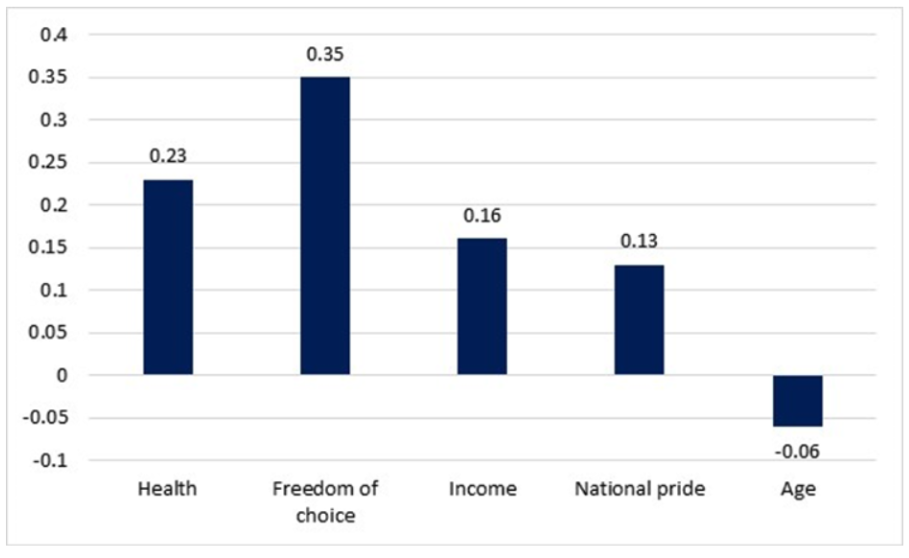Ukraine is confronted with a complex challenge of fostering social cohesion among its residents. The success of this endeavour largely depends on ensuring that individuals experience a sense of content with their lives. We analyzed data from the 2020 World Values Survey to identify the key factors influencing life satisfaction in Ukraine. We established that traditional determinants such as health, and income play a significant role in defining the overall satisfaction of Ukrainians with their lives. Moreover, the degree of national pride and the sense of personal control over life choices emerged as influential factors impacting happiness levels within the country.
Authors: Anna Melnyk, Dzvenyslava Hryniv, Khrystyna Petrynka, Mykyta Zalozetskyi and Roman Mychka, KSE students
Life satisfaction is a comprehensive measure encompassing an individual’s overall happiness and contentment with their life circumstances. It has a wide spectrum of dimensions, including emotional well-being, the quality of interpersonal relationships, and professional accomplishments. Understanding the determinants that influence life satisfaction is of paramount importance as it provides invaluable insights into human well-being.
Enhancing life satisfaction within a population has profound implications not only for each individual but also for societal progress. A higher level of life satisfaction is associated with various positive outcomes, such as improved rates of economic development, increased productivity, and better social cohesion. Additionally, it contributes to greater overall resilience in the face of challenges and increases political participation and civic engagement.
Our main objective is to identify and understand the key determinants of life satisfaction in the specific context of Ukraine. To achieve this, we apply Ordinary Least Squares regression to the data from the 2020 World Value Survey (WVS), which offers a rich source of information on values, beliefs, and perceptions. Our analysis aims to detect factors that underpin life satisfaction in Ukraine. Knowing these factors, we offer some policy interventions that can enhance the well-being of Ukraine’s residents.
Our dependent variable is life satisfaction indicating the level of a person’s satisfaction with one’s life. It is measured on a scale from 1 to 10, where 1 represents complete dissatisfaction and 10 – complete satisfaction.
As explanatory variables we include age in years, income level measured on a 1-10 scale with 1 – lowest income group and 10 – the highest income group, health condition presented on a five-point scale ranging from 1 – very bad to 5 – very good health, national pride that ranges from 1 – “I am not proud at all of Ukraine” to 4 – “I am very proud of Ukraine”, and freedom of choice which ranges from 1 – “I do not influence the course of my life at all” to 10 – “I strongly influence the course of my life”.
Selection of explanatory variables is grounded in existing research. In theory, age significantly influences an individual’s overall life satisfaction, typically following an inverse pattern. However, the literature acknowledges the diversity in the sources of life satisfaction across different age groups. For younger people, happiness is often associated with success, wealth, and romantic relationships, while older individuals tend to prioritize their health as a key determinant of life satisfaction. Numerous studies highlight the role of self-perceived relative income (which is the variable that we use) in determining happiness, with higher relative income levels generally leading to greater life satisfaction. The literature consistently highlights the critical role of health in people’s happiness: healthier individuals tend to report higher levels of life satisfaction than those experiencing health issues.
Lastly, we include the variables of national pride and freedom of choice in our analysis. There may not be precise theories or comprehensive studies directly addressing the impact of these variables on life satisfaction, especially in the context of Ukraine. Nevertheless, we include these variables due to their significance in the current Ukrainian context. National pride reflects the importance of ethnic identity and attachment to one’s country, while freedom of choice is foundational to the principles of democracy. These aspects are particularly relevant for today’s war situation.
We first look at trends in happiness levels in Ukraine over recent decades and compare them to those in other countries. As depicted in Figure 1, Ukraine witnessed a rise in life satisfaction levels towards the late 1990s and early 2000s. Over the past decade life satisfaction stabilized on a rather constant level of about 6 of 10.
Figure 1: Average levels of life satisfaction in Ukraine over WVS Waves
Figure 2 demonstrates that generally people in Ukraine tend to report lower levels of happiness compared to individuals in European Union countries that participated in the last round of World Values Survey (2017 – 2020).
Figure 2: Average satisfaction with life across EU countries in WVS7 (2017-2022)
Furthermore, Ukrainians’ life satisfaction levels remain the lowest (see Figure 3 below) among the former Soviet Union countries included in the last round of World Values Survey (2017 – 2020).
Figure 3: Average Satisfaction with life across FSU countries WVS7 (2017-2022)
We estimate the importance of the selected predictors in shaping the level of life satisfaction in Ukraine. To make the coefficient estimates comparable, they have been recalculated as standardised coefficients summarised in Figure 4. Collectively these five predictors account for 36.9% of the variability in observed happiness scores. Freedom of choice and health condition appear to be the strongest determinants of life satisfaction in Ukraine. Specifically, a one standard deviation increase in the health score corresponds to an estimated average increase of 0.23 standard deviations in life satisfaction. Similarly, feeling more control over one’s life choices leads to greater life satisfaction, with a one standard deviation increase in the freedom of choice being associated with an estimated average increase of 0.35 standard deviations in life satisfaction.
Figure 4: Standardised coefficients for the key predictors of life satisfaction in Ukraine
Going up the imaginary “income ladder” improves happiness. These results are in line with our hypotheses and the existing studies. A sense of greater pride in Ukraine also positively impacts life satisfaction: a one standard deviation increase in national pride corresponds to an estimated average increase of 0.13 standard deviations in happiness. Lastly, a one standard deviation increase in age results in an estimated average decrease of 0.06 standard deviations in the life satisfaction score. Age appears to be the weakest determinant of happiness in Ukraine. None of higher-order terms such as interactions or quadratic effects appeared to be statistically significant in our analysis. This can be explained by the fact that the majority of our predictors are categorical variables with a limited measurement scale range.
Overall, our results for Ukraine support the existing analysis for other countries. Other studies have found that better health and higher relative income are associated with higher life satisfaction, while the impact of age on happiness is negative. We can compare only signs but not the magnitude of coefficients from other studies due to differences in measurement methodologies across studies (different scales for life satisfaction and predictors) and different datasets which they use. Furthermore, freedom of choice and national pride have never been considered by the previous studies.
Our findings are useful for formulation of policy recommendations aimed at enhancing life satisfaction of Ukrainians within the country. Considering the strong positive impact of health conditions on life satisfaction, reforms that keep people healthy – better access to healthcare, promotion of healthy lifestyles – should be the priority. The national healthcare reform launched in 2017 paved the way for a more inclusive and higher quality healthcare system. Little progress, however, has been made in promoting healthy lifestyles among residents of Ukraine (relevant policies include education, especially at school, creating public places for sports, promoting vaccination). Healthier lifestyles would strengthen the prevention component in the national healthcare system and allow to reduce the number of serious conditions.
Positive relationship between relative income and life satisfaction suggests the need for two types of policies: promotion of competition (limiting monopolies), improvement of the business environment, so that more people could find a job or start their businesses (in the war and reconstruction context, a necessary policy for this would be war insurance), and enhancing economic equality. The latter may include higher taxes on wealthier individuals and targeted support for the poor.
Finally, our findings show that the sense of national pride and freedom of choice are robust and influential determinants of life satisfaction in Ukraine. Thus, it is necessary to implement the democratic mechanisms whenever possible (e.g. elections during the war are impossible but public discussions on financing priorities at both local and central level are both possible and desirable) as well as foster a deeper connection to Ukraine’s national identity and heritage. The latter implies, for example, support of museums, books, films etc. that would educate Ukrainians about their history and culture. These efforts are not only conducive to individual well-being but also can strengthen the fabric of the nation and contribute to its social and political development.
Attention
The authors do not work for, consult to, own shares in or receive funding from any company or organization that would benefit from this article, and have no relevant affiliations






